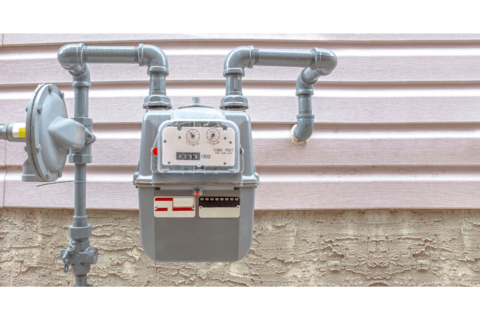Recognizing Gas Leaks: Signs, Risks, and Immediate Actions
A gas leak can be more than an inconvenience- it’s a serious safety hazard. Left unchecked, it can cause health issues, property damage, and even explosions. Recognizing the warning signs early can prevent disaster. Knowing when to act and who to call can make all the difference.
The Most Common Signs of a Gas Leak
Gas leaks don’t always come with an obvious warning. Some signs are subtle, while others demand immediate attention. Stay alert to these key indicators:
1. A Distinctive Rotten Egg Smell
Natural gas has no odor on its own. To help detect leaks, utility companies add mercaptan, a chemical that smells like rotten eggs. If that sulfur-like scent lingers in your home or business, assume the worst. Ignoring it could put lives at risk.
2. Unusual Hissing Sounds
Gas should remain sealed within pipes. If a leak forms, gas escapes under pressure, creating a faint hissing or whistling sound. This noise is most noticeable near gas appliances or exposed lines. In a quiet environment, it may be easier to detect. If you hear it, don’t take chances- act fast.
3. Physical Symptoms That Don’t Add Up
Gas leaks reduce oxygen levels, leading to noticeable health effects. Symptoms often include:
- Headaches or dizziness
- Nausea or breathing difficulties
- Eye and throat irritation
- Unusual fatigue or confusion
If symptoms improve when leaving the building but return upon reentry, a gas leak could be the cause. Exposure can become life-threatening, so never ignore unexplained illness.
4. Dead or Dying Vegetation
Gas leaks don’t just affect people- they harm plants too. Underground leaks cut off oxygen supply to roots, causing nearby grass and plants to wither. If an isolated patch of vegetation dies without explanation, an underground leak may be to blame.
5. Visible Damage to Gas Lines
Gas lines and connections should remain in good condition. Corrosion, cracks, or physical damage increase the risk of leaks. Regularly inspect gas appliances, pipes, and meters for signs of wear. If damage is visible, don’t attempt a fix yourself- call a professional.
Taking Preventative Measures
Gas leaks are dangerous, but they’re also preventable. A few simple steps can reduce the risk:
1. Install Gas Detectors for Extra Protection
Physical signs aren’t always immediate. Gas detectors provide an extra layer of security, sounding an alarm when gas levels rise. For best results, place detectors near gas appliances and in bedrooms for early warnings.
2. Schedule Routine Inspections
Gas systems need regular maintenance to stay safe. Annual inspections of heaters, stoves, water heaters, and gas lines can catch problems before they escalate. Plumbers and gas safety professionals can identify wear and tear early, preventing future leaks.
3. Educate Everyone in the Home or Workplace
Gas safety isn’t just for homeowners- it’s for everyone in the building. Knowing how to recognize a leak, respond safely, and shut off the gas supply can prevent disaster. Even simple precautions, like avoiding sparks near a suspected leak, can save lives.
What to Do If You Suspect a Gas Leak
A gas leak isn’t a “wait and see” situation. If you think there’s a problem, act immediately:
1. Evacuate the Area
Leave the building as quickly as possible. Do not use electrical switches, lighters, or phones inside. Even a small spark can trigger an explosion.
2. Shut Off the Gas Supply
If you know how and it’s safe to do so, turn off the main gas valve. This can help prevent further leakage.
3. Call for Help
Once in a safe location, contact your gas utility provider or emergency services. Do not re-enter the building until professionals declare it safe.
4. Seek Professional Repairs
Only a certified plumber or gas technician should handle gas leak repairs. DIY fixes are not an option- improper handling can make the situation worse.
The Role of Professional Plumbers in Gas Safety
Gas leaks require specialized knowledge. Certified plumbers have the tools and expertise to detect leaks, make repairs, and ensure your system is up to code. If you suspect a gas issue, don’t hesitate- call a professional. Safety should never be left to chance.
Final Thoughts
Gas leaks are silent threats, but they don’t have to be unpredictable. Recognizing the warning signs, acting quickly, and relying on professionals can prevent catastrophe. Whether it’s an unusual odor, hissing sound, or unexplained illness, staying alert could save lives.
Never ignore a potential gas leak. If in doubt, get out- and call for help!
Your Go-To Plumbing Services in north DFW
Specialty Plumbing is a family-owned and operated company proudly serving North DFW, including Celina, Frisco, McKinney, Plano, Allen, and Prosper, and surrounding areas. Our team is committed to providing exceptional customer service because we understand that plumbing issues can arise unexpectedly. Our mission is to resolve them swiftly and efficiently! Reach out to us today, for any plumbing service you need, and witness our commitment to excellence firsthand!
At Specialty Plumbing we love to empower our clients with general knowledge of their plumbing systems! If you have any questions on a topic, please feel free to reach out. We’re here to continue creating content that educates you further on your plumbing system.
